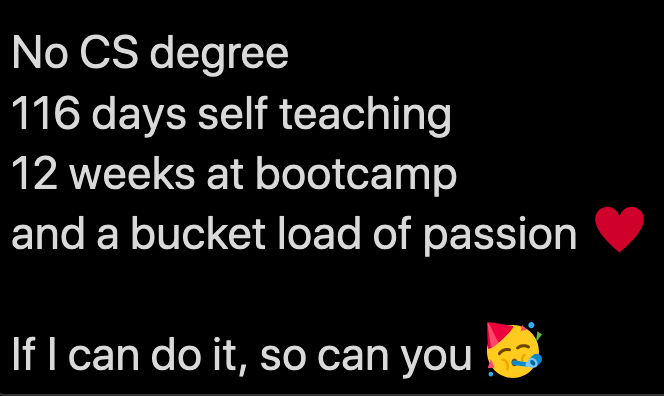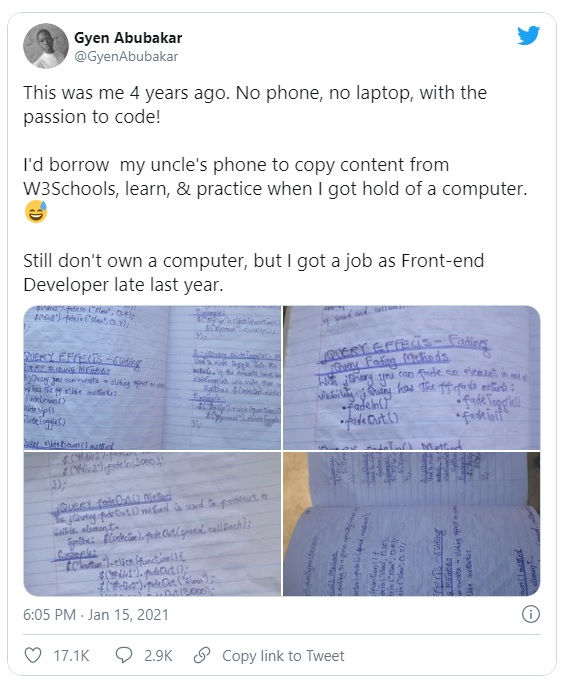
I wish that during the days when I was learning to program, someone told me to stop reading articles about "How to Become a Developer in X Months." So let me get this message across to you.
Stop reading these damn articles.
I understand that some people will resist this statement (especially the authors of such articles). To begin with, I will note that this is exclusively my opinion. If you enjoy reading articles like this, don't let me stop you.
But if you are a beginner developer, you better ignore such articles (or at least treat them with great distrust).
Let me explain why.
"If I managed to do it quickly, then you will succeed!"
One of the hardest things in my career is changing it. Changing careers is not an easy task. This cannot be done on a whim, or in the blink of an eye. This needs to be paid close attention and learn a lot over a long period of time. Unsurprisingly, this can hurt you both financially and emotionally.
One of the thoughts that came to me when I was a beginner developer is that you need to clearly link goals and hopes. The more ambitious your goals are, the more hope you have to get through difficult times. At what point do goals become unrealistic and hope false?
I learned the answer to this question the hard way. When I learned to program, I started from the very bottom. I didn't have any experience. Neither HTML nor CSS. I haven't even edited my MySpace page.
I had a dead end job, and I wanted to build a career with potential for growth. I've read studies that say programmers are generally satisfied with their jobs and have good salaries. This was the catalyst that called for starting the search for developer vacancies.
However, I understood that the circumstances were not in my favor. I entered the realm of technology at a complete zero, and I was 20 years old. I didn’t know what the likelihood was that I would find a job, let alone the fact that I didn’t understand what kind of job I was aiming for.
Fortunately, a quick search on Google yielded many developer success stories. For a budding developer like me, it was intoxicating. The titles reflected exactly what I was looking for.
- "How I learned to program in 6 months - and got into Google"
- “How I became a self-taught developer in 7 months. You can too "
- "How I went from novice to software engineer in 9 months, working full time"
I devoured these articles in batches because they gave me what I needed: hope.
I considered myself a relatively smart guy. If there really were people who got hi-tech jobs in six months to a year, I could be one of them. After all, many of these articles proclaimed, "If I can, so can you!" This hope prompted me to dive into the realm of technology.

I have no higher education in Computer Sciene
116 days of self-study
12 weeks of courses
and a lot of enthusiasm
If I succeeded, then you can
Reality quickly made adjustments to this picture. In case you didn't know: 6 months is not much. Before I knew about it, I was just in my sixth month of school, and I didn't have much to show. Yes, I already knew the basics of HTML, CSS and JavaScript, and I could create a static site. But I was not at all ready for work.
All these articles like “How I got my first job as a developer in 6 months”, which once comforted me, became my nightmare. The more time passed, the more they oppressed me. A year passed, and my attempts to get a job went unnoticed. I stopped thinking, "If they could, then I can." Now I was thinking, “How did they do it? Am I capable of this at all? " I no longer looked like the heroes of these successful stories.
It wasn't until I decided to stop reading these articles that my spirits began to rise. As tempting as it was to compare myself to my peers, I let it go and focused on my journey.
Although it took a while, I got out of the rat race. And I was able to reflect on my own journey and learn some important truths.
I'm not the only one who felt this way
Even though I'm focused on my own experience, it wasn't just me who felt this way. Every year more and more people enter the field of technology. I often talk to new developers, and their opinions on these types of articles overlap with my own.

Thanks for writing this, friend! I was one of those who read these articles and was miserable. As I meet honest people like you who are willing to accept the unpleasant part of this path, I find the strength to accept it too.
This is what I usually say to these people.
These articles do not reflect the reality for most. The
simple truth is that most aspiring developers do not find a job for 6 or even 12 months. Many professional developers have higher education in this area , it takes about 4 years to get it. Even if we drop college and consider only courses, only a small percentage of their graduates will find a job within a year.
If we take a look at the employment data from Fullstack Academy , a well-known and respected educational institution based in New York, we can see that 52% of graduates found a job 6 months after completing their courses in 2019. But if we look at the people hired as software developers, their share is only about 35%.

The program itself is designed for 17 weeks (13-week curriculum with four weeks of preparation). We can assume that all participants studied something before coming to these courses (from a couple of weeks to a couple of months). This means that about a third of people attending Fullstack Academy will find a job within a year of starting their coding education.
These results are not unique to Fullstack Academy. You can view the hiring data after different courses and compare yourself .
Honestly, all things considered, these are not bad results. But if you compare this small group with the entire layer of novice developers (students, completed courses and self-taught), this is a small piece.
The reality is that if you are considering starting a career in technology, it will most likely require at least a year of study. It took me over two years to finally get my first job. And there is nothing wrong with that.
Learning to program is difficult. Remarkable is the fact that you can even go to this field without a diploma in less time than it takes to get it, and for a small fee. There is no need to complicate the task by setting arbitrary deadlines. Finally…
You cannot control time
I once watched a YouTube video from a "career coach of programmers" giving advice to aspiring developers. He emphasized one piece of advice:
“Set yourself a one year deadline. When it comes, you should start trying to get a job. "
This is terrible and harmful advice.
You cannot speed up your learning and the time it takes to find your first job. Deadlines can be motivating, but they won't make your brain understand JavaScript faster. According to Hofstadter's Law , when you set a deadline for yourself, you inevitably fall behind. The training lasts exactly as long as necessary.
But when novice developers read these success stories, they feel like they can manage time. Many authors of such articles glorify all this commotion. Such people burn out very much.
On average, I sat in a cafe from 8 to 12 hours.
, , 50 . , .
SSP Hack Reactor 4 , 6 12 . , JavaScript, , .
* 7 . .
* , JavaScript.
* , JavaScript .
* I come to work at 9 am, leave at 17. To be honest, sometimes I smoked weed when I came home.
* Study and Program from 6 pm to 3 am
* Repeat at first
You may feel that grueling hours of work and not sleeping will bring the same results. But research has shown that spending more time does not guarantee productivity gains.
When it comes to finding a job as a developer, a number of factors come into play. People have different benefits:
- Programming experience
- Higher education
- Proximity to the technology hub
- Mentors and assistants
- Social media subscriptions
- Ability to behave during interviews and when communicating
All these and many other variables play a role and can give someone an advantage. Even having a computer and an Internet connection is more than some people have.

Unfortunately, few of these articles recognize the benefits of being an author, leading you to believe that all you need is to hurry, hurry, and hurry.
Don't be tempted by pornography. Be kind to yourself . Workaholism and burnout are common in technology. We don't need more people to fall prey to them.
Conclusion
There is nothing wrong with writing articles like "How I Became a Software Developer." I wrote them myself , so I understand why people write them.
Entering the realm of software is a phenomenal achievement that should be noted and documented. It is catharsis to write and reflect on your experiences. Moreover, such articles are very popular. They get clicks and views. People will never stop writing them. And they shouldn't.
It is important for readers to remember that these are just anecdotes - the experience of a single person. These are not tutorials and they suffer from bias. Very few people will be able to achieve the same results.
For every person who gets their first tech job in six months, there are dozens more that took years. But you won't see these stories because “How I Became a Developer in 24 Months” doesn't sound so cool.
It doesn't matter if it takes you six months, two years or more to become a software developer. Entering the realm of technology is just the beginning. What's more important is what you will do when you get into it.
- Russia's first serial control system for a dual-fuel engine with functional separation of controllers
- There are more lines of code in a modern car than ...
- Free Online Courses in Automotive, Aerospace, Robotics and Engineering (50+)
- McKinsey: rethinking electronics software and architecture in automotive

Vacancies
, , , - .
, , , .
, , . , , , , , .
, , .
, , , .
, , . , , , , , .
, , .
- -
- -
About ITELMA
-
automotive . 2500 , 650 .
, , . ( 30, ), -, -, - (DSP-) .
, . , , , . , automotive. , , .
, , . ( 30, ), -, -, - (DSP-) .
, . , , , . , automotive. , , .